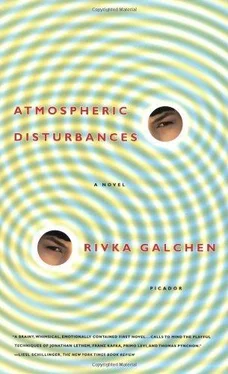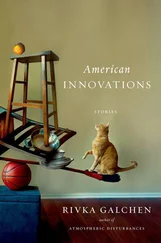1 ...6 7 8 10 11 12 ...49 Again the phone rang.
“Hello,” I said, bringing the cold plastic receiver to my face.
“Leo Liebenstein.”
“Yes,” I said, not even rising from my reclining position because I didn’t want to lose the warmth I’d invested in the cushions of the sofa.
“Leo Lieben—”
“Yes,” I interrupted sleepily but louder.
“To whom am I speaking?” the voice on the other end said politely, in a strange accent. Or what seemed like a poor imitation of a strange accent.
And I began to feel more awake. “Who is this?” I asked.
Muffled bickering came through the line; then it sounded like the phone dropped. Just as I was about to hang up, a new voice came on, this time thin, sandy, and ambitious.
“I’m calling from the Royal Academy of Meteorology; we’d like to invite you to become a fellow. Would you—”
“Harvey?”
“Sir, I’m calling from the Royal Aca—” Again I heard a tussle over the phone. Then I heard Rema’s voice, though I couldn’t make out the words. I thought the voice was coming to me through the phone.
“Rema?” I called into the phone loudly, startling myself.
“The teakettle!” answered Rema’s voice — now clearly traveling directly from the bedroom — and I could feel the hot atmosphere my own voice had made near the phone’s mouthpiece.
“We’d like to make you a fellow,” I heard. “Do you understand? It’s a tremendous—”
I hung up.
I looked around the room: rocking chair, scratched wood floor, Godzilla poster — my familiar life. And Rema? I crossed over to the closed bedroom door, leaned against its unsmooth grain, and listened. I heard just that sound of cupping a hand over an ear. Of a distant ocean marked with a yellow flag, of my own ear anatomy breaking up the trajectories of randomly moving molecules of air, hearing its own little self-made sound universe. And suddenly I sensed my ridiculousness — pressing a cupped ear against a door in my own apartment — sensed, with a rising sadness, my familiar space growing foreign to me.
I abandoned the sounds of my ear cupped to the bedroom door. I went to the kitchen, turned the click-clicker of the gas stovetop — blue-orange burst! — filled the kettle with tap water — a nice contact sound! — and rested it on the flame. I love the different sound stages of water on its way to boiling. I like listening to the teakettle’s tremble. Our teakettle’s handle is slightly loose, and its shaking adds another harmonic layer over the tremulousness of the metal.
“Who was that?” came the voice.
I turned and saw her, under the kitchen’s lintel, wearing my button-up and her little boy shorts, thigh slightly rotated inward, holding that russet puppy — dog — in one hand. She walked past me, leaned against the counter near the stove; Rema had always liked leaning there, in just that way, so she could feel the heat, and so she could turn off the flame before the teakettle’s whistling had ever really begun. Maybe on account of that lean, despite that dog-puppy, I began silently to argue to myself: this must be Rema. This must be her. Believe this Rema like you always do. Look at her. Is she really more strange today than any other day? The hair, the eyes, the long legs leading down to slightly pigeon-toed feet. Who else could it be? Believe this Rema like you always do.
But I knew that my reasoning was post hoc, and another voice came in, mocking me, reminding me that post hoc reasoning is the consolation of the psychotic — all evidence interpreted under the shadow of an axiomatic belief that one is Jesus Christ, or the king of Sweden, or made entirely of glass.
Why should I believe, just by fiat, that this woman was Rema, when that ran contrary to the phenomenology?
The simulacrum tilted her head at me, like puppies tilt their heads.
And a high-pitched pain, like a thousand tiny moths, began to collect behind the front of my skull, accelerating, advancing. Something was wrong. I reached out and put my hand on where I expected her abdomen to be, because I had a feeling my hand might pass right through her, as if she were a hologram, as if only the clothing were real. But I was all wrong about what was wrong. My hand did not go through her abdomen, which was real, or appeared to be so, as solid, anyway, as anything else I know, though I suppose they say it’s almost all empty space, the building blocks of matter — a moth in a cathedral? — but one shouldn’t take the extension of such metaphors too seriously.
She looked at my hand on her abdomen. Then she squinted at me, as if to put me in focus.
“Wait, who was that on the phone?” she asked again.
The pain in my head had grown dizzying so I sat down on the cool blue tile floor, sat by that woman’s foot, and looked at the blue vein there across her arch. For a time during my medical training, on account of so often drawing blood and placing IVs, my eyes would travel, of their own accord, to plump veins. I would search feet and hands and wrists and crooks of elbows, and it would be difficult for me not to reach out and place the pad of a finger on those veins and feel the blood coursing through. It’s like a ghost living in us, our blood, that’s what I think it is like, having something within us — like our blood, like our livers, like our loves — that goes on about its business without consulting us. I touched that vein there on Rema’s foot. I feel like I can say that, that the foot at least, that foot was really Rema’s. Or probably not really. Or so only in that every foot becomes, in my mind, Rema’s foot slightly varied. And Rema’s foot is like Rema entire; her foot alone is enough to recall her to me whole. I don’t know, I was very confused then.
“Leo,” this woman said to me gently. “Leo, are you all right? I’m sorry I was angry earlier, I didn’t mean to hurt your feelings about Harvey’s leaving. I think that is what this must be about. I don’t think it is your fault. Only you think it is your fault. Maybe it is my fault. Is that what this is about?”
I was petting her pretty foot. The teakettle’s trembling had advanced somewhat. I could hear the puppy, the dog, in her arms, above me, panting.
“What,” I asked her — and I asked gently because even if she wasn’t Rema she still seemed like a very nice person—“would you say if I told you that the Royal Academy called me?” I pressed on the arch’s vein very lightly, and watched its world go white.
“The Royal Academy?”
“You know which I mean,” I said quietly, wondering if she knew what I meant. I leaned down and kissed her foot, which was cold and dusty, as was the tile floor that I then stretched myself out upon more fully. “Of Meteorology.”
“Leo?”
“Where Tzvi Gal-Chen is a fellow,” I said, gesturing with my head toward the refrigerator, though Tzvi’s family photo was no longer there, I don’t know where things like that disappear to, the kinds of things one has on one’s fridge. These things are not just under the fridge like you might think, because I could see under the fridge and I saw only a curled fruit label sticker and a child’s jack.
The woman turned the kettle off. It wasn’t — by sound stage — even near boiling. She set down that animal (who began licking my face and disturbing my peace) and sat down next to me. “Jokes aren’t funny,” she said to me, “when they need lots of explaining. Are you feeling well? You look sad, Leo.”
A prominent vein tortured across her hand too. I could press on the vein and it would fade to white and then return again, to that very particular blue.
She said, “Your walk. Do you want to tell me how it was? It’s a cloud out there.”
I thought that she was right, not just about the cloud, but about how jokes did lose their humor when they needed explaining, and I thought that maybe I had been making a joke , and that it hadn’t been the Royal Academy that had called. Later, when the phone rang again, I insisted that neither of us pick it up. We sat together on the sofa that evening and I kept my eyes on the floor and at one point I told “Rema” that I missed her, and I leaned over and bit her ear gently, and then I kissed her hand and the inside of her wrist, but that dog was running about, and quietly, in my thoughts, I apologized to Rema because I had wanted to hold that other woman. I think you can imagine the feelings that I had, and their strangeness to me.
Читать дальше
Конец ознакомительного отрывка
Купить книгу












